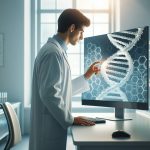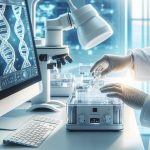General Genomics, a cutting-edge bioinformatics and AI tool, offers users in-depth insights into how likely they are to develop certain diseases and how well treatments might work for them. Founders AJ Rosenthal and Warren Gieck shed light on the critical role of owning medical data in shaping future healthcare that’s both personalized and proactive.
The company’s backstory: The inspiration for its creation and its development journey
In the early days of 2020, as the world was grappling with the onset of a global pandemic, AJ found himself in a position to make a difference. With schools closed and his son’s anxious inquiries about the virus that was sweeping across continents, AJ felt compelled to seek answers. This concern for his family’s well-being led him to reconnect with Warren, a former colleague from their days at General Electric and an expert in artificial intelligence now working in Calgary, Alberta.
Together, they saw an opportunity to harness machine learning algorithms not just for theoretical applications but as practical solutions to pressing global issues. It was an untapped potential that sparked their motivation. The realization that no one had ventured into this domain before fueled their determination even further. Before long, they were laying the groundwork for what would become General Genomics, marking their entry into uncharted territory with patent registrations.
AJ and Warren’s backgrounds were not rooted in healthcare, which made their venture into creating groundbreaking solutions in this field all the more audacious. Their previous experiences across various sectors like aviation, oil and gas, and healthcare involved handling extensive datasets—a skill that proved invaluable as they navigated through medical data with surprising agility.
Their mission transcended beyond just business; it was deeply personal. They envisioned creating a world where future generations could thrive without fear of emerging health threats—General Genomics stood as their beacon of innovation against traditional industry constraints.
The duo’s journey epitomizes the essence of disruption—challenging norms and pioneering novel approaches outside conventional parameters. Their work underscores a broader narrative: when driven by genuine concern for humanity’s welfare coupled with relentless creativity, there are no limits to what can be achieved outside one’s native terrain.
How does AI contribute to healthcare?

In the healthcare sector, there’s a vast ocean of data that remains largely untapped. The current approach to medical research often limits its focus to a handful of variables, such as comparing the effects of a drug against a placebo in controlled groups. This method, while standardized, falls short in unraveling the complex reasons behind why certain individuals experience side effects from medications while others do not. The warnings issued by pharmaceutical companies about possible side effects lack detailed explanations on who might be at risk and why.
The quest now is to dive deeper into the available health data garnered from varied sources including genetics, wearable tech, and health analytics. People are constantly generating extensive data about their health through various means. Buried within this data lie critical answers to pressing health questions—why do some suffer severe reactions to diseases like COVID-19 while others remain symptom-free? The answer could lie in any combination of factors such as age, race, sex, ongoing medications or even dietary supplements.
Introducing machine learning into healthcare offers promising prospects for decoding these mysteries. By analyzing genetic maps alongside an array of other health indicators gathered from wearable devices and medical history, it’s possible to uncover intricate patterns that influence disease susceptibility and treatment outcomes. However, focusing merely on singular variables provides only a glimpse into the potential insights hidden within our biological blueprints.
Take hypertension as an illustrative case; often termed Primary Hypertension when its cause remains unknown despite numerous interventions. This suggests that perhaps we’re not looking at all the right pieces of information yet—maybe lifestyle factors hold more significance than genetics in certain cases.
As we integrate more comprehensive datasets into healthcare analysis, clearer pictures emerge leading towards personalized treatments tailored specifically for individual needs. It highlights an increasing recognition among medical professionals about the importance of leveraging big data for better patient care outcomes.
Moreover, General Genomics is spearheading this revolution with significant strides already made evident by two patents filed concerning disease susceptibility and treatment survivability assessments.
This growing reliance on detailed health analytics represents a beacon of hope for tackling challenges like opioid addiction head-on by enabling doctors to prescribe pain management solutions with higher precision based on specific patient profiles—a crucial step towards mitigating risks associated with trial-and-error medication strategies.
What’s needed to share individual health information widely?
In today’s world, where information is abundant, medical professionals are increasingly relying on strong scientific evidence to guide their treatment decisions. This shift towards a more data-driven approach mirrors the methods used in engineering and other fields. The advent of new tools and technologies plays a pivotal role in this transformation, enabling doctors to refine their strategies for patient care.
A key focus of our initiative is empowering people to take charge of their health records. Traditionally, accessing one’s own medical results can be challenging, often, individuals receive only a summary rather than the complete dataset that belongs to them. This information becomes particularly crucial when patients need to move across different geographical locations or wish to share their health history with family members, research entities, or new healthcare providers.
The importance of personal agency over one’s medical information cannot be overstated. Currently, the system primarily allows access to this sensitive data through medical professionals which can be limiting. For example, dentists may require access to a patient’s recent blood tests or scans but find themselves unable to directly retrieve this information due to restrictions in accessing these medical databases.
Recognizing the need for greater control and privacy regarding health information led us to develop a fully anonymized database system. This ensures that even in the event of a security breach, there would be no way to link the data back to an individual. By providing robust security measures alongside user-friendly access permissions, we enable individuals not just to view their records but also decide who else gets to see them.
This evolution towards better management and accessibility of personal health data signifies a broader movement toward informed self-care and empowerment in healthcare decisions—a vital step forward in how we perceive and manage our well-being in an increasingly interconnected world.
What is your vision for the future of medical care?
In the ever-evolving world of healthcare, the horizon looks promising with advances that promise to enhance both patient care and medical practice. The focus is shifting towards a more nuanced understanding of treatment effects, empowering patients and doctors to make decisions grounded in detailed knowledge. As we tread into the future, personalized medicine and telemedicine stand out as beacons of progress, making health information more accessible than ever before.
What many might not realize is that healthcare tops the chart of government expenditures worldwide, surpassing sectors like education and defense. Streamlining healthcare through effective data utilization could significantly bolster our economies. But it’s not just about economics; improving public health — both physical and mental — remains paramount.
The trend toward holistic approaches in countries like Canada and the US marks a shift towards embracing diverse medical practices. This includes alternative medicines which have seen a surge in popularity for those seeking tailor-made preventive care solutions. Amidst this shift lies an increased interest in functional medicine where nutrition-based interventions such as vitamins and supplements play a crucial role, especially highlighted during recent times like the pandemic with an emphasis on immune-boosting nutrients.
However, personalization has its limits within certain medical scenarios such as emergencies or acute conditions where standardized care prevails. The real transformation needs to happen at grassroots levels – starting with family practitioners who are pivotal in integrating new paradigms into routine care.
The debate around best practices isn’t new; it often mirrors broader societal divisions yet underscores the importance of moving beyond binary perspectives in healthcare discussions. At General Genomics, we believe in transcending these debates by adopting an unbiased approach focused on equipping doctors with advanced tools for better data application. Through leveraging AI technologies, we envision ushering in a new era of precision medicine that exceeds current expectations.
Ultimately, taking charge of one’s health journey becomes essential amidst these advancements. While technology paves the way for innovative treatments and preventive measures, individual choice plays a critical role in navigating through myriad healthcare options available today.




















